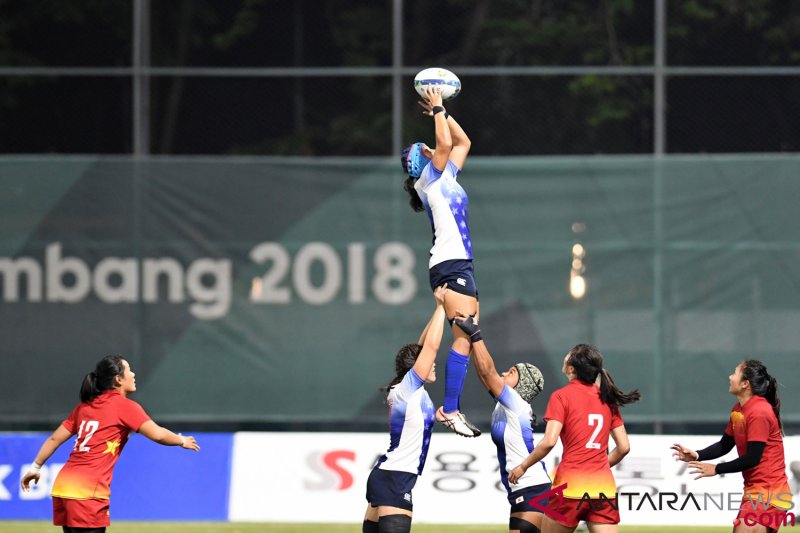Such a high-level competition surely needs to ensure its supporting factors are well taken care of. From physical therapy needs and accommodation to transportation and food, everything needs to be given special attention to ensure the athletes are receiving the best care and services they can get, in an effort to maintain their overall well-being.
When it comes to the athletes` food consumption, the Indonesia Asian Games 2018 Organizing Committee (INASGOC), along with the healthcare team consisting of staff from the Ministry of Health, the Food and Drugs Agency and Health Offices from Jakarta, South Sumatra and West Java, continue to carry out strict supervisions in order to ensure the safety of food consumed during the 2018 Asian Games.
Head of the 2018 Asian Games Health Team Dr. Bambang Wibowo said there was a certain Standard of Procedure (SOP) to be followed in ensuring the safety of food. The company that provides the catering, he said, has to meet several technical aspects and provide hygienic food.
In addition, Hazard Analysis Critical Control Points (HACCP) are also applied, which means there is a structured operating method that is internationally recognized and is able to help organizations in the food and beverage industry identify food safety risks and prevent harm; at the same time, they are also obliged to ensure legal compliance.
"Supervision is carried out every day in three shifts (morning, afternoon and night) through a rapid test, in the form of food sampling to be presented and periodic monitoring-evaluation in Jakarta, Palembang and West Java," he said.
The tests are carried out around 30 minutes before the food is served.
"Breakfast starts at 5 a.m. and finishes around 10 p.m., lunch starts at 11 a.m. until 3 p.m. and a food service is also provided from 5 p.m. to 10 p.m. for dinner; aside from that, bread and milk are also served and maintained at 65 degrees Celsius," he explained.
There are also samplings and inspections, and in order to avoid misunderstandings with foreign athletes, the health team has applied "Non-Drinking Water" stickers on taps, as Indonesia`s tap water cannot be consumed directly.
The Asian Games Health Team has also formed a Rapid Motion Team, which is on stand-by around the clock.
If there are any irregular cases, such as food poisoning, an investigation will immediately be conducted to determine the reason behind them.
The Jakarta Health Office also affirmed its commitment to ensuring the safety and quality of the food provided to the athletes.
Head of the Health Office Koesmedi Priharto said there are 55 officers who are assigned to ensure the safety of the food.
"They are being placed in a number of hotels in which the athletes are staying at during the Asian Games, as well as the Athletes` Village," he said.
In fact, he added, the officers also carry out checks before meals are served to the athletes. All of that is the responsibility of the food safety officers.
He revealed that the officers are also required to carry out an inventory while examining food sold in restaurants around the Asian Games arena.
He further revealed that after a restaurant is checked, the officers put up a sticker that reads "Aman Saji" or safe for consumption. Examination of food in restaurants around the venue is also carried out to ensure the safety of food for the athletes.
A vast variety of cuisine
However, the extensive measures taken to ensure the safety and quality of the food provided do not come at the cost of the choices and taste of the food itself.
Vice President of the INASGOC Sjafrie Sjamsoeddin stated that the Committee has prepared a special menu that has been adjusted to suit the habits and lifestyles of the contingents.
He also admitted to have checked the menus provided by hotels and the cuisine provided for certain groups, for example, the Muslim athletes, who wish to have Halal food.
The INASGOC, he said, has intentionally created a special menu targeted to each country in accordance with the athletes` lifestyle, in order to maintain their well-being.
Prohibitions at the Athletes` Village
Previously, the INASGOC revealed that they prevented athletes or officials participating in the Asian Games from bringing beer to the Athletes` Village in Jakarta or Palembang.
"Beer from outside the guesthouse is not allowed inside the village. We confiscate bottles and cans of beer," said Deputy I for Sports INASGOC Harry Citizen.
The 18th Asian Games athletes from abroad, he said, have their own habits in their country such as consuming alcoholic beverages, especially athletes who are no longer competing.
Citizen explained that the rules for the ban on beer or cigarettes in the Athletes` Village is in reference to the policy of the Asian Olympic Council, regarding the management of the athletes` village for the Asian Games participants.
Pewarta: Aria Cindyara
Editor: Suharto
COPYRIGHT © ANTARA 2018













